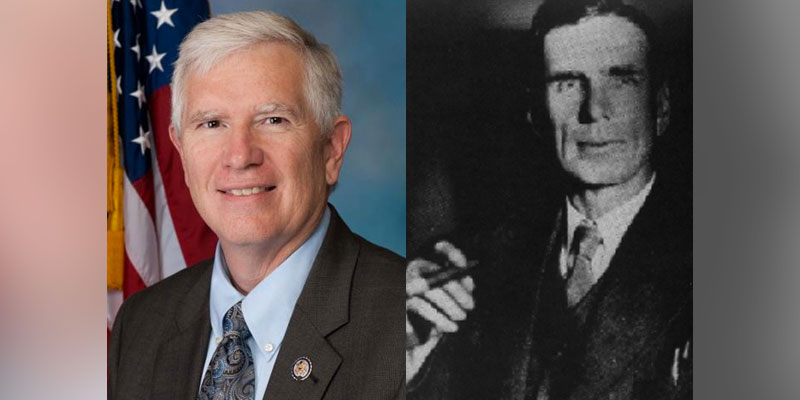The courageous Alabama judge who originally set aside a guilty verdict in one of the infamous “Scottsboro Boys” trials will be posthumously honored with a post office bearing his name.
On Thursday, Republican Congressman Mo Brooks’ (AL-5) bill to designate the United States Postal Service Office located at 1110 West Market Street in Athens, Alabama as the “Judge James E. Horton, Jr. Post Office Building” passed the United States House of Representatives by voice vote.
The legislation has clear bipartisan momentum, with every other member of Alabama’s House Delegation cosponsoring the bill.
In a press release, Brooks said, “For his bravery in the face of extreme racial prejudice and for his willingness to support justice that risked and ended his judicial career, Judge Horton deserves the posthumous honor of having the Athens, Alabama Post Office named for him, and it is appropriate that his legacy be held up as a guide for future generations.”
The congressman outlined, “Judge James Edwin Horton was born in Limestone County, Alabama on January 4, 1878. Despite having no formal education until he was eight or nine, Judge Horton was accepted to Vanderbilt University’s medical studies program and, later, to Cumberland University where he earned his bachelor and law degrees. Judge Horton served in the Alabama State Legislature until he took a Limestone County, Alabama chancery court position. Thereafter, he was elected circuit court judge for Alabama’s Eighth Judicial Circuit. After reelection to a second term, Judge Horton was appointed to preside over the retrials of the highly controversial and nationally renowned ‘Scottsboro Boys’ cases.”
Brooks continued, “By way of background, the ‘Scottsboro Boys’ cases involved nine African Americans, ages 13 to 20, accused of raping two white women on a train in 1931 as it traveled through Scottsboro and Jackson County, Alabama. In the first trials, eight of nine defendants were found guilty and sentenced to death, a verdict later reversed by the United States Supreme Court. After a guilty verdict and death sentence during the second set of Scottsboro Boys trials, Judge Horton bravely issued an order setting aside the jury’s guilty verdict against Haywood Patterson and ordered a new trial. In 2013, the Scottsboro Boys were formally pardoned under Alabama law.”
Horton, speaking about the case and the falsely accused defendants at the time, explained that “the man who engages in anything that would cause the death of any of the prisoners is a murderer; he is not only a murderer but a cowardly murderer.”
“I absolutely have no patience with mob spirit. … Your very civilization depends upon the carrying out of your laws in an orderly manner,” Horton said.
The judge believed that everyone should fairly receive due process, regardless of race or ethnicity.
Immediately after setting aside the verdict, Horton was removed from the case by the Alabama Supreme Court. He was heavily criticized for his ruling, but he stood his ground and did not back away from his decision.
At the next election, Horton was overwhelmingly voted off the bench and, after growing threats to his life by white supremacists, he and his family were forced to flee from town. He left politics and spent the rest of his days working on his farm and running a small private practice.
Horton died on March 28, 1973, at the age of 95 and was interred in the Athens City Cemetery. Shortly after his death in 1973, county officials installed a plaque in his old courtroom with a quote of his from the trials: “So far as the law is concerned, it knows neither native nor alien, Jew nor Gentile, black nor white. This case is no different from any other. We have only to do our duty without fear or favor.”
He was posthumously elected into the Alabama Lawyers Hall of Fame in 2010 by the Alabama State Bar. One of the main reasons that he received that honor was because of his outstanding dedication to justice.
In October of last year, Athens dedicated a statue of the judge in front of the Limestone County Courthouse. The Limestone County Bar Association decided to erect the statue, and the Judge Horton Monument Committee was established to raise the $60,000 needed in private donations.
Next to this statue, a plaque describes the way that Horton lived his life. His most famous quote – “Let Justice Be Done Though the Heavens May Fall” – is written at the very bottom.
Brooks’ bill, H.R. 6513, still needs to pass the United States Senate.
It was gratifying yesterday afternoon to pass my bill naming the Athens Post Office for Judge James E. Horton Jr., who stood for truth & justice when he set aside the verdict & death sentence for one of the Scottsboro Boys, Haywood Patterson. https://t.co/i35du1GVSd
— Mo Brooks (@RepMoBrooks) November 30, 2018
Sean Ross is a staff writer for Yellowhammer News. You can follow him on Twitter @sean_yhn













